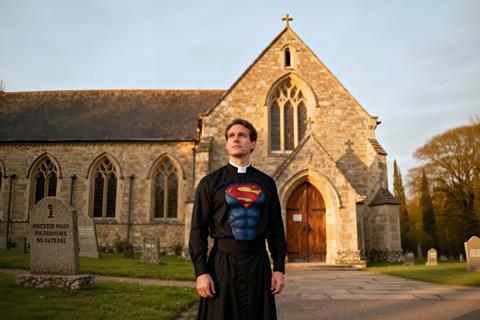It’s often impossible for church leaders to live up to the lofty expectations placed on them by their congregations, says Rev Jamie Sewell. Your local vicar can’t do it all

In 2018, after 20 years of working in Christian ministry as a youth worker and serving on various leadership teams, I felt the call to priesthood.
At the time, I thought I had a pretty good idea of what being a priest meant. But now, in my third year of curacy as curate-in-charge, I’ve come to realise that the true meaning of priesthood is something God continues to reveal to me daily. It has been one of the most joyous, and at times one of the most painful, adventures of my life.
Hebrews 5:1 says, “For every high priest chosen from among men is appointed to act on behalf of men in relation to God, to offer gifts and sacrifices for sins.” Being a priest is no small order. The reality of stepping into a position where you hold responsibility for the spiritual well-being of others, or in my case, when you carry the cure of souls for a parish, is a daunting task. As much as it is a huge privilege, it can also at times feel overwhelming.
Part of that sense of being overwhelmed comes from the sheer number of elements tied up with a person’s spiritual well-being. There are innumerable facets to the role. And the truth is, it is ultimately an impossible job to fulfil. Because my task is never to save or transform anyone, that is Christ’s work alone. I can only ever point people to the great high priest, Jesus Christ. As 1 Timothy 2:5 reminds us: “For there is one God and one mediator between God and mankind, the man Christ Jesus.”
Still, the weight of the role is real. On paper, I am responsible for both the pastoral care of those who gather in our church community and the missional task of reaching the whole parish. In White City, that’s over 4,000 households, alongside nearly 100 people on our electoral roll. I hold the tension of discipling those who are committed, while also trying to reach those who have never set foot in the church.
And with that come the expectations, some realistic, some bordering on the impossible!
High expectations
There is an expectation that I will know when someone is unwell (even if no one has told me). There is an expectation that I will be at the prayer meeting and the home visit, the PCC and the sickbed, all at the same time. There is an expectation that I will be a devoted father to my son and a loving husband to my wife, while also somehow being available every hour of the day for pastoral visits.
Then there’s the rest: I need to be a building expert, a gardener, a safeguarding specialist, a financial manager, a school governor, and a local historian. I’m expected to understand boilers, unblock drains, and keep the parish lawn looking respectable. And somewhere in the middle of all that, I still need to write a sermon for Sunday!
Leaders need both high expectations and deep support. We stand in a position where we seek to imitate Christ, but we are, at best, poor imitations.
Now, I don’t say any of this to moan. In fact, I find it quite funny. The breadth of the role is astonishing, and humbling. Because ultimately, it brings me back to the truth: I can’t do all of this, and I was never meant to. The task of the priest is not to be everything to everyone, but to be a bridge, pointing beyond myself to the one who truly can carry it all.
After a particularly stressful day a few weeks ago, I sat in the garden with a glass of red wine and cringed as I reflected on some of my own behaviour towards past vicars and church leaders.
The mirror that has been Priesthood
I remembered my very first boss in a church setting, Pastor Dave. On Sunday mornings he would anxiously put out the chairs, lining them up with great precision, wanting everything to be just right. And what did I do? I would wait until he straightened the final row and then quietly nudge one chair slightly askew, just to watch him notice and correct it again. For reasons I can’t quite explain, I took far too much delight in winding him up like that.
I used to move fire extinguishers from their agreed location, purely because I knew it would annoy him. Somewhere in my younger self, there was a strange joy in pushing the pastor’s buttons.
And it wasn’t just practical jokes. I can remember sitting in meetings, criticising decisions church leaders had made, I’d criticise things they had done wrong and then move onto things they hadn’t done at all. I was quick to point out faults, slow to consider the weight of the responsibilities they carried.
I was equally harsh with sermons. If the preacher was too long, I criticised. Too short, I criticised. If the theology wasn’t deep enough, I grumbled. If it was too heavy on theology, I rolled my eyes. Too flippant? Not flippant enough? I always found a reason to complain. All the while forgetting that most Sunday congregations are incredibly diverse: some with years of biblical depth, others with none at all. The task of the preacher is to build a bridge for all of them, a challenge I never appreciated until I found myself in the pulpit.
It was the same with liturgy. Not enough? I complained. Too much? I complained. Communion was too rushed, or it dragged on too long. The blessing was insufficient, or far too wordy. Whatever it was, I had an opinion, and often it was a critical one.
And in mission, I would moan that we weren’t knocking on enough doors, or that we weren’t spending enough time outside the church. All the while forgetting that the vicar had probably conducted three funerals that week, prayed at the bedside of a dying parishioner, and made countless phone calls of support and encouragement.
Recently, after reflecting on all this, I had to pick up the phone to a few of my former church leaders. I wanted to say thank you — for their patience, for their commitment to my spiritual growth, and for the many times they absorbed my unfair and unrealistic criticism with grace. More often than not, instead of defending themselves, they simply apologised. Only now do I see the sacrifice and humility in that.
Honour and insensitivity
What I’ve experienced as a priest is a very odd combination: people extending extreme honour and respect to me because of the order I hold, while at the same time creating a kind of distance. There is something in the dynamic of being a parish priest where people can forget that you have bad days. They can forget that when they bring their complaint to you, it might be the tenth complaint of the day, and that each one may be pulling you in a completely different direction.
There is often an unspoken assumption that the priest exists solely for me, which is, in one sense, true. But perhaps it’s easy to forget that the priest is also responsible for the other thousands of people in the parish, not just the one voice in front of them.
I’m coming to realise that this dynamic can leave priests without much space for others to hold concern for their well-being. Parishioners don’t always see that as their responsibility, and in one sense, they are right. Priests are entrusted with public responsibility and visibility, there is a high expectation for holiness. But if the expectation is that a priest will never make a mistake, will never falter, then that expectation is unfair.
The task of the priest is not to be everything to everyone, but to be a bridge, pointing beyond myself to the one who truly can carry it all.
Just as priests across our nation preach grace from the altar to the congregation, it is fundamentally important that parishioners also extend grace from the congregation back to the altar.
For a church community to thrive, leaders need both high expectations and deep support. We stand in a position where we seek to imitate Christ in order to point others towards him, but we are, at best, poor imitations.
So, as a word of encouragement to my fellow clergy; well done, good and faithful servant. Keep your head up. Keep grafting. You’re doing a great job.
And to parishioners, I want to encourage you, this week, why not send your vicar a kind message of thanks? If you were planning to let them know that Sunday’s sermon was too long, too short, or not engaging enough, maybe hold that one back for now, and instead send a word of encouragement. Buy them a box of chocolates. Write them a note that says, thank you. Remind them of the ways they have blessed you, and let them know you appreciate it.
Because ultimately, the Israelites did reach the promised land, not because everything was smooth, but because together they kept putting one foot in front of the other. Despite all the wobbles along the way, they shared a common belief that God was leading them somewhere better than where they were.
And the same is true for us today. This isn’t about feeling sorry for priests, but about strengthening the whole church. When parishioners encourage their priests, everyone benefits. A strengthened priest is better able to serve, to lead, and to point us all more clearly to Christ.






































No comments yet